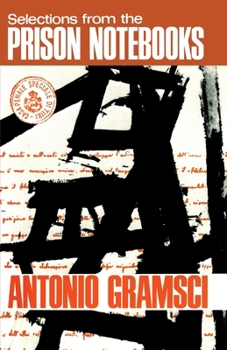Selections from the Prison Notebooks of Antonio Gramsci
(Book #3 in the Quaderni del carcere Series)
Antonio Gramsci's Prison Notebooks, written between 1929 and 1935, are the work of one of the most original thinkers in twentieth century Europe. Gramsci has had a profound influence on debates about... This description may be from another edition of this product.
Format:Paperback
Language:English
ISBN:071780397X
ISBN13:9780717803972
Release Date:November 1971
Publisher:International Publishers
Length:572 Pages
Weight:1.40 lbs.
Customer Reviews
4 ratings
Today, the marxism is gramscism
Published by Thriftbooks.com User , 15 years ago
I read this book, here in Brazil, some years ago.Please, I'm a complete anti-communist and I must tell that this the best marxist book, I ever saw. Why?Because in all places of the world, in the last thirty years, the left got victories, using ever Gramsci's ideas. No Marx's or Leninist original ideas sent left any power.Since 1979,in Nicaragua, there's no communist revolution, in any part of the world. Whithout a single shot, left imposed communist tyrannies in places such as Venezuela, Bolivia, Zimbabwe,etc. And left got Brazil, Argentina,Venezuela,etc. using Gramsci's ideas. Guevarism sent Che Guevara himself to defeat and a grave easily for Bolivia's army. Gramscism sent the bolivian Evo Morales to total power, with no risk and without a single shot. Gramsci showed to the left, during 1920 decade, how to get power, in nowadays. Today, the marxism is gramscism.Read this this book and see this fact.
The Lost World
Published by Thriftbooks.com User , 20 years ago
Michel Foucault once remarked that Antonio Gramsci is a figure much cited and little read. Once upon a time (in the 90s, when things seemed more dismal, then they really were) neoconservatives were warned that Gramscianism was conducting a "long march through the institutions": leftists of a freethinking and free-wheeling bent threw around "organic intellectual" as denoting indigenous members of collective subjects not quite proletarian, and wondered whether "hegemony" was being orchestrated by hip-hop provocateurs. But in yet another retrenchment of yet another cruel decade, Gramsci has fallen off the map. The neocons wonder if Hillary Rodham Clinton is "angry" about things other than her man and Whitewater; the bohemian leftists wonder about Empire, or stay silent. Which is probably well enough, when it comes to the Gramscian corpus. For although this is the work of an ill-deserved confinement courtesy of one of the world's more notable totalitarian regimes, its stated aim is to be itself "totalitarian" in conception. Antonio Gramsci was something much more complex than a "freedom fighter", and his pronouncements regarding a multitude of subjects in this selection from his *Quaderni del carcere* deserve to be analyzed critically rather than sympathetically. "Open Marxism" this is not: Gramsci has three major tasks, all of which are compatible with Leninist-Stalinist orthodoxy. Firstly, to analyze the "passive revolution" which has put forth another alternative to progressive political change yet left the productive forces of the economy modernizing with all due speed; secondly, to celebrate the fact of the Communist party's Russian dominance by studying not-necessarily-democratic "hegemony" as a form of political expression throughout modern history; thirdly, to advocate a form of Marxism thoroughly divorced from the materialist scruples of mechanics and keeping its eyes focused firmly on the historical here and now. All of which are interesting projects, worthy of the best political science and historical ontology that the bourgeois world has to offer, but all of which compete with more explicitly liberatory ideologies (Trotsky's "permanent revolution", representative democracy, Encylopedic enthusiasm for a truly popular science) and offer nuance rather than redemption. Gramsci's communism is, cliched though it may be, somewhat Jesuitical and overly "disciplined" in the face of historical setbacks and core organizational shibboleths of the Comintern: we are offered only details filling out a party line we should believe in anyway, rather than a stirring defense of people power. This book is brilliant, rather than inspirational, and its theses should be troubling, if enlightening, for a member of the democratic left.
A marxist must read!
Published by Thriftbooks.com User , 21 years ago
This selection from Gramsci's "Prison Notebooks" contains his most important work written during his imprisonment from the italian fascist regime. It includes "the Intellectuals", texts on Education, Notes on Italian History, "The modern Prince", "State and Civil Society", "Americanism and Fordism" and notes on the philosophy of praxis, together with a very informative introduction on the italian Communist Movement in the first decades of the 20th century. In this collection Gramsci's theory of "hegemony" in class societies is fully presented, together with his intepretation of Marxism both in philosophy and in the analysis of the modern world. Gramsci was on of the foremost leaders of the Italian Communist Party; in his trial in 1927 the fascist Public Prosecutor proclaimed that his brain must be stopped from functioning for twenty years. Fortunately, Gramsci proved to be a devoted fighter in prison and his Notebooks furthered -in many points- the analysis of Marx and Lenin of how capitalism functions and how it could be overthrown.
One of the century's most important political works
Published by Thriftbooks.com User , 26 years ago
Gramsci's Prison Notebooks marks one of the nodal points of Western Marxism's break with Leninism and the breed of marxism born of the Bolshevik Revolution. Exploratory and incomplete, the insights contained in this volume marked a turning point in marxist thinking, indeed leading many right through the marxist fold and out the other side. Gramsci's insights into philosphy, cultural criticism, political economy, and politics make this a crucial resource for anyone interested in any of these themes today ... marxist or otherwise. And for those interested in the 'fall' of marxism, Gramsci is perhaps the most important starting point. A veritable critical goldmine!!!!






